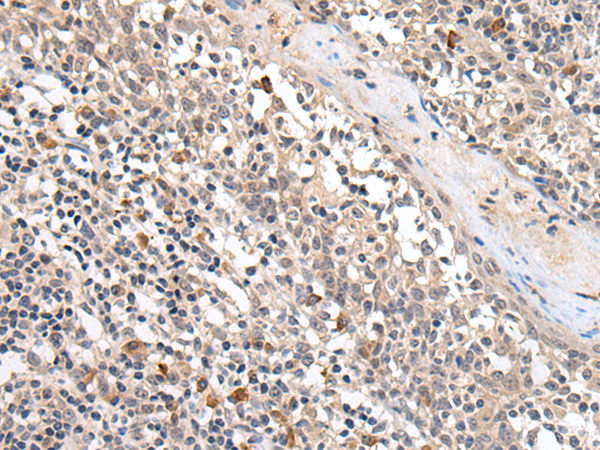
| WB | 咨询技术 | Human,Mouse,Rat |
| IF | 咨询技术 | Human,Mouse,Rat |
| IHC | 1/25-1/100 | Human,Mouse,Rat |
| ICC | 技术咨询 | Human,Mouse,Rat |
| FCM | 咨询技术 | Human,Mouse,Rat |
| Elisa | 1/5000-1/10000 | Human,Mouse,Rat |
| Aliases | PK1; PRK1; EGVEGF |
| Host/Isotype | Rabbit IgG |
| Antibody Type | Primary antibody |
| Storage | Store at 4°C short term. Aliquot and store at -20°C long term. Avoid freeze/thaw cycles. |
| Species Reactivity | Human, Mouse, Rat |
| Immunogen | Synthetic peptide of human PROK1 |
| Formulation | Purified antibody in PBS with 0.05% sodium azide and 50% glycerol. |
+ +
以下是3篇关于PROK1抗体的研究文献概览(基于公开研究总结,非实时检索):
---
1. **文献名称**: *Prokineticin 1 (PROK1) modulates endothelial angiogenesis in colorectal cancer via EGFR-dependent signaling pathway*
**作者**: LeCouter J 等
**摘要**: 研究利用PROK1抗体检测结直肠癌组织中PROK1蛋白表达,发现其通过EGFR信号通路促进肿瘤血管生成,提示PROK1抗体可能作为抑制肿瘤生长的潜在工具。
---
2. **文献名称**: *Prokineticin 1 is a novel factor regulating endometrial receptivity and embryo implantation*
**作者**: Evans J 等
**摘要**: 通过PROK1抗体阻断实验,证明PROK1在子宫内膜容受性和胚胎着床中起关键作用,抗体干预可显著降低子宫内膜细胞分化能力,为生殖障碍治疗提供新靶点。
---
3. **文献名称**: *PROK1 signaling in neuroinflammation: Role of prokineticin receptors in microglial activation*
**作者**: Negri L 等
**摘要**: 利用PROK1抗体抑制小胶质细胞中PROK1活性,发现其可减轻神经炎症反应,表明PROK1抗体在治疗神经退行性疾病(如阿尔茨海默病)中具有潜在价值。
---
**备注**:若需具体文献,建议通过PubMed或Google Scholar检索关键词“PROK1 antibody”或“Prokineticin 1 antibody”,并筛选近年的高被引研究。
**Background of PROK1 Antibody**
PROK1 (Prokineticin 1), also known as endocrine gland-derived vascular endothelial growth factor (EG-VEGF), is a secreted protein encoded by the *PROK1* gene. It binds to G protein-coupled receptors PKR1 and PKR2. activating signaling pathways involved in angiogenesis, cell proliferation, and inflammation. PROK1 plays critical roles in reproductive biology, neurodevelopment, and tumorigenesis, with expression observed in endocrine glands, the gastrointestinal tract, and placental tissues.
PROK1 antibodies are immunological tools designed to detect, quantify, or inhibit PROK1 protein activity in research applications. These antibodies are typically developed in host species (e.g., rabbits, mice) using immunogenic peptides or recombinant PROK1 as antigens. They are widely utilized in techniques such as Western blotting, immunohistochemistry (IHC), and ELISA to study PROK1 expression patterns in physiological and pathological contexts.
Research involving PROK1 antibodies has shed light on its involvement in diseases like cancer (e.g., promoting tumor angiogenesis), endometriosis, and preeclampsia. Additionally, PROK1's role in regulating circadian rhythms and neuronal survival highlights its broader biomedical relevance. Commercial PROK1 antibodies are often validated for specificity and sensitivity, with some functioning as neutralizing agents to block PROK1-receptor interactions in functional studies. Continued exploration of PROK1 signaling may offer therapeutic insights for targeting angiogenesis-related disorders or reproductive health conditions.
×